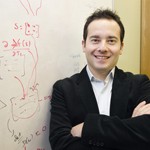We have a wonderful slate of classes we will be presenting to prospective University Scholars visiting campus on March 17th and 18th. Here's a quick rundown of the course titles and the exceptional Northeastern faculty members who will be teaching the seminars.
Master Classes will highlight areas of seminal importance in particular academic and interdisciplinary fields. Northeastern University faculty will present their research as a springboard for a lively exchange with University Scholars. Master Classes will also provide an insider’s perspective on how faculty are both framing and moving their research forward toward use-inspired contributions in areas as disparate as urban landscape design to the study of neglected disease drug discovery.
University Scholars can expect to gain an understanding of some core considerations in a particular field, the important link between research and application, and a range of interdisciplinary topics that provide a foundation for future study.
 Master Class: “Innovation! Using Design-Thinking to Create Business Ideas with New Meaning”
Master Class: “Innovation! Using Design-Thinking to Create Business Ideas with New Meaning”
Professor Gordon Adomdza
D’Amore-McKim School of Business, Entrepreneurship & Innovation
Professor Gordon Adomdza’s research interests are in the areas of entrepreneurial opportunity discovery and validation, as well as the ideation stage of the new product development process. He also has a developing interest in sustainable business models for social innovations.
Dr. Adomdza teaches courses in design-driven innovation, using the design-thinking approach to develop new ideas. He also teaches courses in new venture creation in entrepreneurship, using market research to develop new ideas while employing simulation of the start-up process and a soft-launch to validate the ideas. Further, his pedagogical philosophy of experiential entrepreneurship, guides his role as the faculty advisor to the Entrepreneurs Club, http://www.neu.edu/entrepreneurs/, one of the most visible clubs on campus.
Gordon graduated from University of Waterloo, Ontario, Canada, in 2008 with a Ph.D in Management of Technology, and where he also received an MASc in Management Science and an MA in Applied Economics. He also received a BA in Economics from University of Ghana, West Africa.
 Master Class: “How to Design a City for the 21st Century?”
Master Class: “How to Design a City for the 21st Century?”
Professor Jane Amidon
Director, Urban Landscape
College of Arts, Media and Design, School of Architecture, Department of Urban Landscape
Dr. Jane Amidon is a Professor of Landscape Architecture and Director of the Urban Landscape Program in the Northeastern University School of Architecture. Amidon teaches studio, lecture and seminar courses focused on the ideas, histories and design strategies of changing cities. Amidon’s work in urban landscape is an extension of two seminal areas of interest: modernism as a critical stance in mid-century landscape practice, and modernization as the remaking of the American landscape at increasingly monumental scales. Building upon this foundation her current scholarship is in the emergence of entrepreneurial environments.
Amidon earned her MLA from Ohio State University in 1995. Amidon has lectured and published extensively on contemporary urban landscape and the related topics of modernism and modernization of the American landscape. Recent publications include “Big Nature,” in Design Ecologies: Essays on the Nature of Design (Blostein and Tilder, eds) and “Eclogue for the Metropolis,” in PRAXIS Journal v. 10. Published books include Radical Landscapes: Reinventing Outdoor Space (2001) as well as monographs on Kathryn Gustafson (2005) and Dan Kiley (1999). She served as the founding editor for Source Books in Landscape Architecture series. In 2011 she co-organized the symposium Landscape Complexity and Transformation with The Cultural Landscape Foundation, as well as the Second Wave of Modernism II Conference at MoMA. Amidon continues to lecture at universities and institutions internationally.
 Master Class: “The Power of Pious Fashion: The Islamic Veil as Political Critique”
Master Class: “The Power of Pious Fashion: The Islamic Veil as Political Critique”
Professor Liz Bucar
College of Social Sciences and Humanities, Department of Philosophy and Religion
Associate Professor Liz Bucar’s primary research areas are comparative religious ethics, Muslim ethics, and the study of gender and sexuality. In her work, she examines contemporary gender issues and their historical groundings within comparative religious traditions, seeking to understand a given thinker's or community’s argument or practice, while also challenging presumptions about what is "real," "true," and "good.” In her recent book, Creative Conformity, Bucar describes and explains a difference of positions on gender and sexuality within two religious traditions renowned for conservative teachings on sex, Catholicism and Shi'i Islam. Countering scholarship that has viewed the two religious traditions as hostile to feminist claims, Creative Conformity demonstrates how certain liberal secular assumptions about these religious traditions are only partly correct and, more importantly, misleading. Recent articles from Bucar include, “The ‘Invention’ of Lesbian Acts in Iran,” and “Saving Face: Navigating Land Mines with Ritual Politeness in Iran”; her new book, The Islamic Veil: A Beginner’s Guide was recently published.
Bucar, holds a B.A. in Government from Harvard University, an M.A. in Religious Studies from the University of Chicago, and earned her Ph.D, in Religious Ethics at the University of Chicago Divinity School. Prior to arriving at Northeastern, Bucar was a Postdoctoral Fellow at Georgetown University and held an Assistant Professorship at the University of North Carolina, Greenboro. Bucar is currently the Secretary-Treasurer for the Society for the Study of Muslim Ethics, the first academic association dedicated to the study of Muslim ethics.
 Master Class: “How Cells Sense and Respond to Mechanical Forces”
Master Class: “How Cells Sense and Respond to Mechanical Forces”
Professor Erin Cram
Principal Investigator, The Cram Lab
College of Science, Department of Biology
Associate Professor Cram’s research focuses on interactions between cells and their extracellular environment and how they play an essential role in controlling tissue architecture, cell survival, and cell migration. These processes are important for normal animal development and are disrupted in many human diseases. The Cram lab uses the nematode C. elegans to investigate the conserved processes that control cell migration and mechanotransduction in vivo. In collaboration with Chemical Engineers, Dr. Cram also working to improve production of drug compounds by the medicinal plant Catharanthus roseus.
Cram earned her Ph.D. from the University of California, Berkeley. Before joining Northeastern in 2006 she conducted postdoctoral research at Princeton University from 2001-2006. Recent Publications include “CCDC-55 is Required for Larval Development and Distal Tip Cell Migration in Caenorhabditis Elegans” in Mechanisms of Developmentand “A Novel mutation in Beta Integrin Reveals an Integrin-Mediated Interaction between the Extracellular Matrix and ci-1/p27KIP1” in PloS One.
 Master Class: “The Crisis of Environmentalism”
Master Class: “The Crisis of Environmentalism”
Professor Daniel Faber
Director, Northeastern Environmental Justice Research Collaborative
College of Social Sciences and Humanities, Department of Sociology and Anthropology
Dr. Daniel Faber is Professor of Sociology and Director of the Northeastern Environmental Justice Research Collaborative (NEJRC). His research is focused in the areas of political economy and crisis theory, environmental sociology and policy, social movements, classical and contemporary social theory, environmental justice, philanthropy, Central America and underdevelopment, climate change, and globalization. After earning his Ph.D. in Sociology at the University of California at Santa Cruz, he co-founded and worked as Research Director for the Environmental Project on Central America (EPOCA), and has published numerous works on the political ecology of Central America.
Faber‘s most recent work addresses problems of environmental injustice and equity in America, and includes the 2008 book Capitalizing on Environmental Justice: The Polluter-Industrial Complex in the Age of Globalization and a number of major research reports, including “Green of Another Color” and “Unequal Exposure to Ecological Hazards 2005: Environmental Injustices in the Commonwealth of Massachusetts.” He is a board member of the Alliance for a Healthy Tomorrow, a coalition of scientists, health professionals, environmental advocates, and labor unions working for a precautionary approach to environmental policy in Massachusetts. Faber is currently working on a new report on climate justice, ecological refugees, and equitable policy approaches for dealing with global warming.
 Master Class: “Money Bombs: Visualizing Big Data in Contemporary Politics”
Master Class: “Money Bombs: Visualizing Big Data in Contemporary Politics”
Professor David Lazer
Director, The Lazer Lab, Northeastern Centers for Computational Social Science and Digital Humanities
College of Computer and Information Science
College of Social Sciences and Humanities, Department of Political Science
Professor David Lazer is a member of both the College of Computer and Information Science and the Department of Political Science. Lazer’s work is centered around the notion that how people and organizations are connected together is critical to understanding their functioning, success and failure. In particular, he is interested in the intersections between governance, information, technology, and networks. Sorting through "big data" -- the "vast reservoirs of information about our lives that have accumulated, in everywhere from our inboxes to cellular phone companies to credit card companies, to the Internet" -- Lazer attempts to understand human behavior. During the previous election cycle, the Lazer Lab produced the web site Visual Politics in order to distill some of this big data into illuminating visualizations about our political structures and beliefs. He is the co-editor of Governance and Information Technology: From Electronic Government to Information Government and has also written extensively on the use of DNA in the criminal justice system.
Before joining the Northeastern faculty in fall 2009, Lazer was an associate professor of public policy at Harvard’s John F. Kennedy School of Government and director of its Program on Networked Governance. He holds a Ph.D. in political science from the University of Michigan.
 Master Class: “Health Policy in an Era of Reform: The Obesity Challenge”
Master Class: “Health Policy in an Era of Reform: The Obesity Challenge”
Professor Kristin Madison
School of Law
Bouve’ College of Health Sciences, Department of Health Sciences
Dr. Kristin Madison, a Professor of Law and Health Sciences, writes and teaches in the areas of health economics, health law, and health policy. After receiving her undergraduate degree from the University of California at Berkeley, Professor Madison worked for two years as a research assistant with the health care consulting firm now known as the Lewin Group. She contributed to several articles assessing the impact of the delivery of mental health services. She then received a JD from Yale Law School and a Ph.D. in economics from Stanford University before joining the University of Pennsylvania law faculty in 2001; she came to Northeastern University in 2011.
Dr. Madison’s early work investigated the impact of health care provider affiliations on patient treatment and outcomes. A later series of articles explored health care quality reporting, its regulation, and its implications for medical professionalism, antitrust law, health care fraud regulation, and health care quality regulation more generally. More recently, she has written about the legal, ethical, and policy issues surrounding employers’ use of financial incentives to improve employee health. She is currently examining the relationship between regulation and health policy innovation, as well as ways to reshape health care regulation in light of the greater availability of health care information.
 Master Class: “New Strategies in the Fight Against Cancer”
Master Class: “New Strategies in the Fight Against Cancer”
Professor Lee Makowski
College of Engineering, Department of Electrical & Computer Engineering
College of Science, Department of Chemistry & Chemical Biology
Dr. Lee Makowski, a Professor in Electrical & Computer Engineering and in Chemistry & Chemical Biology, is deeply committed to development of cross-disciplinary approaches to fundamental scientific problems with the potential for contributing to societal needs. His current research is focused on Image and signal processing as applied to biophysical data, and is designed to answer fundamental questions about the molecular basis of living systems. He is collaborating with other scientists to use these methods to address questions that range from the challenges of treating human disease to the efficient utilization of renewable energy resources.
Makowski received his B.S. at Brown University in Physics, and Masters and Ph.D. at Massachusetts Institute of Technology in Electrical Engineering. After doing postdoctoral research at Brandeis University in Structural Biology, he joined the faculty of the College of Physician and Surgeons at Columbia University in the Biochemistry Department. He moved to Boston University as Professor of Physics and later accepted a position as Director of the Institute of Molecular Biophysics at Florida State University. In 1998 he joined the National Science Foundation where he was a Program Director first in the Biology Directorate and then in the Division of Materials Science. In 2000 he moved to Argonne National Laboratory as Biosciences Division Director. He joined Northeastern in the fall of 2010. He is an author of over 100 scientific research papers and numerous review articles on innovative analyses of biophysical data with focus on x-ray and neutron scattering and x-ray imaging.
 Master Class: “Neglected Tropical Disease Drug Discovery at Northeastern and the Integrated Initiative in Global Health”
Master Class: “Neglected Tropical Disease Drug Discovery at Northeastern and the Integrated Initiative in Global Health”
Professor Michael Pollastri
Principal Investigator, Laboratory for Neglected Disease Drug Discovery,
College of Science, Chemistry & Chemical Biology
Associate Professor Pollastri’s research focus is primarily in the area of neglected tropical disease drug discovery. His laboratory’s overarching goal is to apply current state-of-the-art drug discovery techniques to find cures for debilitating neglected diseases, which affect over a billion of the world’s poorest people. Since arriving at Northeastern University in 2009, he has built a large number of collaborations across the parasitology community, proselytizing the driving principle of Target Repurposing as a method to accelerate NTD drug discovery. His collaborators are leaders in malaria, sleeping sickness, Chagas disease, leishmaniasis, lymphatic filiariasis; medicinal chemistry efforts are focused on targeting important protein families including phosphodiesterases, kinases, and histone deacetylases.
Pollastri began his academic career in 2007 after nearly ten years working in early stage drug discovery at Pfizer, Inc. While at Pfizer, Pollastri worked on a variety of programs across therapeutic areas, focusing mostly on gene family-targeted medicinal chemistry. He has a strong interest in technology-enabled medicinal chemistry and synthesis, employing green chemistry, parallel synthesis, flow chemistry, and cheminformatics as a means to accelerate the drug discovery process and reduce costs.
 Master Class: “Engineering Complex Systems: From Idea Generation to Real World Implementation”
Master Class: “Engineering Complex Systems: From Idea Generation to Real World Implementation”
Professor Rifat Sipahi
Director, Complex Dynamic Systems and Control Laboratory (CDSCL)
Mechanical and Industrial Engineering, College of Engineering
Professor Rifat Sipahi earned his Ph.D. in Mechanical Engineering at the University of Connecticut and carried out postdoctoral work at the Universite de Tecnologie de Compiegne, France before joining Northeastern University as an Assistant Professor in 2006. Dr. Sipahi is the director of Complex Dynamic Systems and Control Laboratory (CDSCL), where his team primarily focuses on applying system level approaches to understanding the behavior of dynamical systems with time delays and to creating new approaches for controlling such systems, for solutions in security, automation, and biomedical fields. Some applications that CDSCL is involved with are control of autonomous vehicles, coordination of human machine interactions, writing and holding devices that can mitigate hand tremor effects for Parkinson's patients, and creating low-cost and portable Braille writing devices for the visually impaired. Sipahi has been awarded research funding from the National Science Foundation, Defense Advanced Research Projects Agency, the Center for Integration of Medicine and Innovative Technology, and the MathWorks.
Dr. Sipahi is a Faculty-in-Residence for the Honors Program Living Learning Community in International Village. There he works to support academic excellence, integrate intellectual thought through informal and formal interactions, and provide opportunities for other faculty to interact with students.
 Master Class: “Building an Empire, One Donut at a Time”
Master Class: “Building an Empire, One Donut at a Time”
Professor Bert Spector
D’Amore-McKim School of Business, International Business and Strategy Group
Dr. Bert Spector is an Associate Professor of International Business and Strategy. He has research and teaching interests in strategic change management and business model innovation. He is the author of Implementing Organizational Change: Theory into Practice and Taking Charge and Letting Go: A Breakthrough Strategy for Creating and Managing the Horizontal Company. He co-authored The Critical Path to Corporate Renewal; Human Resource Management: A General Manager's Perspective; and, Managing Human Assets. His articles have appeared in publications including the European Management Journal, Harvard Business Review, Sloan Management Review and Success.
Spector was the recent co-director of the FBI's Emerging Executive program. He has consulted with organizations such as Arbella Insurance, James River, Motorola, the Radisson Edwardian Hotels, Coloplast of North America, and Ricoh, U.K. on issues relating to organizational effectiveness and change. He earned his Ph.D. in American History from the University of Missouri. Spector has been a Visiting Senior Lecturer at MIT's Senior Executive Program, a Visiting Professor at INSEAD (France) and MIT's Sloan School of Management, and an Associate of the Harvard Law School Program on Negotiations. His work on barriers to global innovation has earned funding by the National Science Foundation.
